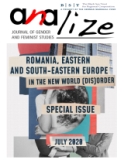Why is China not sexy? When Pop Culture Makes Soft Power and when it Doesn’t
Why is China not sexy? When Pop Culture Makes Soft Power and when it Doesn’t
Author(s): Ana Maria LucaSubject(s): Anthropology, Gender Studies, Media studies, International relations/trade, Sociology of Culture
Published by: Societatea de Analize Feministe AnA
Keywords: international relations; cultural studies; China; Korea; soft power; pop culture; biopower; biopolitics;
Summary/Abstract: While Korean popular culture is gaining ground and is able to influence foreign political discourses, mini-markets with Chinese noodles and dumplings do not become third places for groups of C-pop fans who put on Chinese make up, sing Chinese pop songs and eat Chinese noodles. Nor do C-pop and C-drama fans gather in “We love China” cultural associations to spread Chinese culture and language. These cultural activities have been backed by the Chinese state through its Confucius Institutes, but they have not won the hearts and minds of millions of people around the world. I try to debunk in this research on the Romanian-based Korean and Chinese pop culture fandom the reasons why the same pop culture consumers of Chinese and Korean media products tend to favour the Korean over the Chinese. Based on two concepts, Joseph Nye Jr’s soft power from international relations and Michel Foucault’s biopower and biopolitics from anthropology, I analyse the reactions of Romanian fans to both currents to point out that gender targeted pop culture using women’s bodies to promote political ideas cannot work if they are backed by an authoritarian non-charismatic state.
Journal: AnALize: Revista de studii feministe
- Issue Year: 2020
- Issue No: 14 (28)
- Page Range: 13-23
- Page Count: 11
- Language: English

